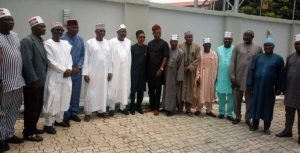The uninspiring political atmosphere in Nigeria is set for dosages of radical flavor Saturday August 8th, 2020 when panelists, party intellectuals and ideologues as well as enthusiasts hold a conversation on party ideology and party supremacy, using the defunct Northern Elements Progressive Union, (NEPU) as the case study. NEPU, the first political party to be formed in the old Northern region of Nigeria, was proclaimed on August 8th, 1950 by eight stalwarts.

 The Centre for Democratic Studies, (CDS) run by the Department of Political Science of Bayero University, Kano is organizing the webinar which would last from 11 am to 1 pm, local time. CDS which is also known as Mambayya House, has sustained a tradition of annual NEPU lecture. Prof Alkassum Abba, one of the panelists and an Ahmadu Bello University, Zaria Historian was among the intellectual squad behind the Balarabe Musa government in Kaduna State in the Second Republic and is the author of books and articles on the PRP which succeeded the NEPU. He is paired with Dr. Saidu Dukawa from Bayero University, Kano while ace public intellectual, Professor Jibrin Ibrahim, will moderate the conversation.
The Centre for Democratic Studies, (CDS) run by the Department of Political Science of Bayero University, Kano is organizing the webinar which would last from 11 am to 1 pm, local time. CDS which is also known as Mambayya House, has sustained a tradition of annual NEPU lecture. Prof Alkassum Abba, one of the panelists and an Ahmadu Bello University, Zaria Historian was among the intellectual squad behind the Balarabe Musa government in Kaduna State in the Second Republic and is the author of books and articles on the PRP which succeeded the NEPU. He is paired with Dr. Saidu Dukawa from Bayero University, Kano while ace public intellectual, Professor Jibrin Ibrahim, will moderate the conversation.
NEPU itself is generally regarded as a populist resistance to feudalism and associated agrarian crisis and taxation. But, according to the late Prof Ahmadu Usman Jalingo, a BUK academic and former Political Secretary to the late Mallam Aminu Kano, NEPU was smart enough to transform local groups fighting local structures of domination across the North into what he calls the radical tradition in Northern Nigerian politics. Although NEPU never succeeded in forming a government at any level in the First Republic, Mallam Aminu Kano, the leader of NEPU, acquired the status of a legend in terms of anti-colonial politics, radical reforms and incorruptibility.


Reviving the radical tradition
The 70th anniversary of NEPU and the issue of party ideology is coming at a time many variables are playing out. Among them is the poverty of ideology existing parties are generally perceived to suffer from; the debate on whether populism is always right wing rather than left-wing; a crisis of national unity following crash of expectation from 20 years of democracy; the complete alienation of the masses from politics and the magnitude of corruption in the country.
Also bound to come up is the prospects of rebuilding the People’s Redemption Party, (PRP) which the NEPU transformed into in the Second Republic. A collection of adherents have been trying to re-package it into what Lenin would call an Archimedean lever that can lift the nation out of present incoherence. It is assumed that the question of the ideological framework by which ‘the radical tradition in the North’ can frame the present crisis and by which frame it can identify and relate to similar platforms around the country towards winning and consolidating power must be most troubling for its ideologues in a highly fragmented entity. Saturday’s conversation is thus additionally important in terms of the clues it offers on the prospects and the challenges of the return of the radical tradition of politics in Nigeria.




























